新概念英语四册课堂笔记 Lesson 13:Thames Waters
新概念英语第四册单词学习手册—Lesson13

mineral ['mɪn(ə)r(ə)l] adj,矿物的 【单词搭配】mineral water矿泉⽔ 【单词例句】 A:Can you offer me a cup of tea? A:能给我⼀杯茶吗? B: Sorry, butI can give you a bottle of mineral water. B:对不起,但是我可以给你⼀瓶矿泉⽔ boring ['bɔːrɪŋ] 钻孔 derrick ['derɪk] 井架 【派⽣词】derricking⽤转臂起重机移动 【单词扩充】headframe井架 【单词例句】 A: We put up an oil derrick there last month. A:上个⽉我们在那⼉竖起了⼀个井架。
B:I think you should tell me that much earlier. B:我认为你应该早点告诉我。
block and tackle滑轮组 rotate [rə(ʊ)'teɪt] v使转动 【派⽣词】rotatable可旋转的 【单词扩充】swivel旋转 gyrate旋转 【单词例句】 A: You mustn't rotate the wheel with A:你不能⽤⼿转动轮⼦。
B:1 won't.I know whatI can't do here. B:不会的,我知道在这⼉哪些不能做。
coring ['kɔ:riŋ] bit [bɪt] 取芯钻头 【单词扩充】column圆柱cone圆锥体 cube⽴⽅体 【单词例句】 A: Around the engine cylinder is a water jacket. A:围绕着发动机汽缸的是⼀个⽔套。
B: What's your purpose to put it there? B:你把它放在那⼉的⽬的是什么? strata ['strɑːtə] [复]岩层 stratum ['strɑːtəm; 'streɪtəm] circulate['sɜːkjʊleɪt] v注⼊,环流 【派⽣词】circulation循环 【单词例句】 A The blood must circulate freely everywhere in the body. A:⾎液应该是全⾝畅通的。
新概念英语第4册课文(中英文对照)
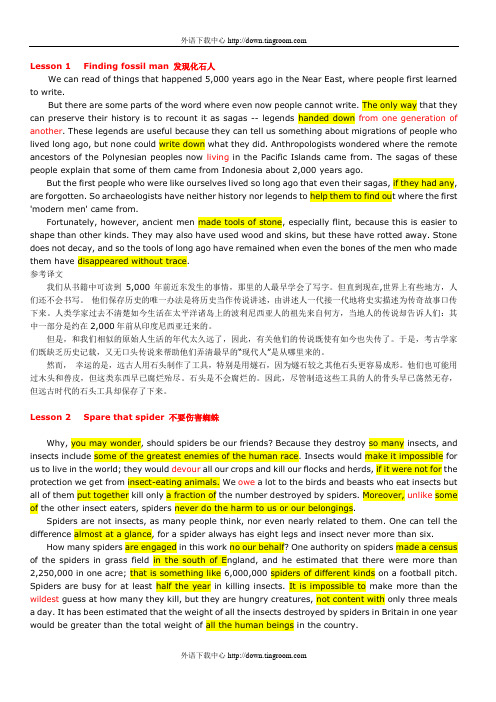
Lesson 1 Finding fossil man 发现化石人We can read of things that happened 5,000 years ago in the Near East, where people first learned to write.But there are some parts of the word where even now people cannot write. The only way that they can preserve their history is to recount it as sagas -- legends handed down from one generation of another. These legends are useful because they can tell us something about migrations of people who lived long ago, but none could write down what they did. Anthropologists wondered where the remote ancestors of the Polynesian peoples now living in the Pacific Islands came from. The sagas of these people explain that some of them came from Indonesia about 2,000 years ago.But the first people who were like ourselves lived so long ago that even their sagas, if they had any, are forgotten. So archaeologists have neither history nor legends to help them to find out where the first 'modern men' came from.Fortunately, however, ancient men made tools of stone, especially flint, because this is easier to shape than other kinds. They may also have used wood and skins, but these have rotted away. Stone does not decay, and so the tools of long ago have remained when even the bones of the men who made them have disappeared without trace.参考译文我们从书籍中可读到5,000 年前近东发生的事情,那里的人最早学会了写字。
新概念第四册笔记
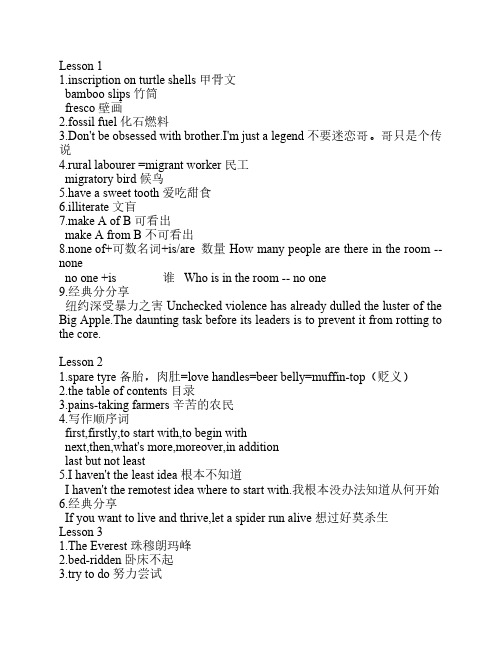
Lesson 11.inscription on turtle shells 甲骨文bamboo slips 竹筒fresco 壁画2.fossil fuel 化石燃料3.Don't be obsessed with brother.I'm just a legend 不要迷恋哥。
哥只是个传说4.rural labourer =migrant worker 民工migratory bird 候鸟5.have a sweet tooth 爱吃甜食6.illiterate 文盲7.make A of B 可看出make A from B 不可看出8.none of+可数名词+is/are 数量 How many people are there in the room --noneno one +is 谁 Who is in the room -- no one9.经典分分享纽约深受暴力之害 Unchecked violence has already dulled the luster of the Big Apple.The daunting task before its leaders is to prevent it from rotting to the core.Lesson 21.spare tyre 备胎,肉肚=love handles=beer belly=muffin-top(贬义)2.the table of contents 目录3.pains-taking farmers 辛苦的农民4.写作顺序词first,firstly,to start with,to begin withnext,then,what's more,moreover,in additionlast but not least5.I haven't the least idea 根本不知道I haven't the remotest idea where to start with.我根本没办法知道从何开始6.经典分享If you want to live and thrive,let a spider run alive 想过好莫杀生Lesson 31.The Everest 珠穆朗玛峰2.bed-ridden 卧床不起3.try to do 努力尝试try doing 小试4.This is the case 事实就是这样5.as poor as a church mouse 一贫如洗6.a six-part meeting 六方会谈7.except for 指出不如人意的地方 +名词8.经典分享电影vertical limitLesson 41.extra-sensory perception 超感官知觉psychometry 接触感应clairvoyance 千里眼telepathy 心灵感应precognition 预知photographic memory 过目不忘2.saft and sound 平安无事3.a safe breaker 撬保险箱的人Better safe than sorry 稳妥比后悔好Better late than never 晚做比不做好4.opaque glass 毛玻璃5.see through 看穿,识破,干完,帮助某人6.Britain's Got Talent 英国达人秀7.She left immediately she finished her job 一…就=hardly/rarely/scarcely…when8.经典分享美剧超人英雄Lesson 51.ask for leave 请假take leave to do 擅自2.have a commitment to 信奉make a commitment to 承诺commit suicide 自杀be committed to doing 决心致力于3.stupid = silly 笨fatuous=ridiculous 愚蠢slow 迟钝4.问题就是That is where the rub isThat is where the problem isThat is the rubThere is the rubThere lies the rubThe rub lies in5.to be done过去不真实的情况意外之事导致结果代替宾语从句6.虚拟语气He acts as if he knew me7.经典分享Never tell a young person that anything cannot be done.God may have beeb waiting centuries for someone ignorant enough of the impossible to do that very thing.—G.M.TrevelyanLesson 61.have no inclination to 不愿做2.black sheep 害群之马3.meet each other 两者meet one other 三者4.nearly 只用于肯定句almost 可用于肯定和否定5.pick up 捡起,接,学会,抱起,爬起6.I will not go unless (I am) invited.be动词才可省7.经典分享Talent wins games,but teamwork and intelligence win championships.—乔丹Lesson 71.obstacle=obstruction 实在的和抽象的障碍barrier 阻塞出入的(栅栏)block 阻塞所有通道的障碍 I had a mental block when I tried to remember my password.脑袋塞住了2.in the vicinity = near3.a shoal of fish = a school of fish 一群鱼a group of people 一群人a swarm of ants 一群蚂蚁a litter of pigs 一窝猪4.部分否定Not all bamboo grows tall=All bamboo doesn't grows tallBoth the windows are not open 窗户不都开着Not every book is educative=Every book is not educativeentirely,altogether,completely,quite完全的词加not表部分否定完全否定用对应的全否定词no,none,neither,no one,neverAll of them can do it - None of them can do itBoth are good - Neither is goodEverybody likes it - Nobody likes itHe is always late - He is never late5.经典分享Brain-twister=Brain-teaser 脑筋急转弯Q:What kind of animal is well educated?A: Fish.Because they go around in schoolsLesson 81.We were slaughtered,55 to 112 我们被宰了(大比分落后)2.keep fit 保持健康fit as a fiddle 非常健康be fit for doing 适合做3.hit the nail on the head 一针见血4.I think the money I have right now will do for the following 2 weeks.do 足够解决问题5.直接引语改间接引语now-thenago-beforetoday-that daytomorrow-the next day;the following dayyesterday-the day before;the previous daythe day before yesterday-two days before6.经典分享乐队 Electrocute的On the beatLesson 91.Casual Friday=Casual Day 便装日2.uni- uniform 制服 mono- monologue 独白bi- bicycle 自行车tri- tricycle 三轮车3.The Netherland 荷兰go Dutch AA制=a Dutch date/treatDutch courage 酒后之勇a Dutch bargain 酒席上的(不公平)交易talk like a Dutch uncle 不留情面的批评4.经典分享I come,I see,I conquer—CaesarLesson 101.a customized car 定制汽车2.He said to us,"Are you going away today?"=He asked us whether we were going away that day."What have you done?"he asked.=He asked what I had done.陈述语序3.经典分享Your time is limited.So don't waste it living someone else's life.Don't be trapped by dogma,which is living with the results of other people's thinking.Don't let the noise of other's opinions drown out your own inner voice.And most important:have the courage to follow your heart and intuition.They somehow already know what your truly want tobecome.Everything else is secondary.Lesson 111.Do you see a justification for XXX 有正当理由2.cheat on 对XX不忠cheat sb of 骗走某人的3.play a vital role in 至关重要的角色vital statistics 三围 bust waist hip4.be weary of 对XX厌倦5.at the idea of 一想到=in the thought ofat the sight of 一看到6.metaphor 暗喻simile 明喻euphemism 委婉语7.委婉语die死pass away,fall asleep,be no more,breathe one's last breath,sleep the final sleep,go to a better world,go to sleep forever,go west,kick the bucketold老人senior citizen,elderly people,people in advanced years,feel one's age养老院a rest home,a nursing home8.经典分享On Education论教育I will take four characteristics which seem to me jointly to form the basis of an ideal character:vitality,courage,sensitiveness,and intelligence.I do not suggest that this list is complete,but I think it carries us a good way.Moreover I firmly believe that,by proper physical,emotional,and intellectual care of the young,these qualities could all be made very common——Bertrand Russell Lesson 121.accont 账户 open a bank accountcurrent account=checking account 活期账户deposit account=savings account 定期账户withdraw 取钱ATM=automated teller machine 自动柜员机 =cash machineteller 出纳员2.in cash 现金支付 by credit card/by a check3.have an obligatin to do=be under an obligation to do 有义务=feel oblige to do4.debit card借记卡5.take a blood specimen 采血样6.带to的间接引语She sain,"Remember to switch off all the lights."——She reminded me to switch off all the lights."Don't make a mess."she said to him——She told him not to make a mess,祈使句He said,"Wait for me."——He said I was to wait for him.why后不可加to7.经典分享Saving Money in Plain English——CommoncraftLesson 131.haul=hoist=lift=raise 拉2.blood circulation 血液循环3.Draw a circle which is 3centimeters in diameter 直径3厘米的元4.make every endeavour to do 非常努力做5.时常 every so often=every now and again=now and again=every once in a while6.avoid doing 避免7.on credit 赊账8.less的用法More haste,less speed 欲速则不达less than 更少 He was less than enthusiastic 一点也不热情less than no time 马上more or less差不多any the less 更少一点 Even though he did that,I did not believe him any the less.我还是相信他much/still less 更不要说=let alone I don't think David would read a book,mich less write one.any more than 和…同样no more than 仅仅9.经典分享At the age of 23,I was a millionaire and retired.Two years later I came out of retirement.A man in his twenties who has known what it is to work can drink only so much champagne and paint the town red only so many times before he wakes up to realize that he is wasting time and energy on meaningless things.——Paul Getty(1892-1976)Formula for success:rise early,work hard,strike oilLesson 141.民谣 For want of 缺少For want of a nail the shoe was lost.For want of a shoe the horse was lost.For want of a horse the rider was lost.For want of a rider the battle was lost.For want of a battle the kingdom was lost.And all for the want of a horseshoe nail.2.foresee 预见 foretell 预知forearm 前臂 forehead 额头forefather 父辈 foresight 远见foreground 前景 foreshadow 预兆3.speculate on/about 推测4.humid 天气湿damp 物,房间湿moist 湿得舒服 moisturizer 润肤膏5.suppose的用法I suppose soI don't suppose 我不认为Do you suppose 你认为be supposed to 应该,广泛认为6.check out 结账离开7.经典分享电影《蝴蝶效应》Lesson 151.keep a secret 保密=hold my tongue about=button up my lip=This is only between you and me=This can never go out of this roomreveal the secret 泄密=let the secret out=let the cat out of the bag2.patent on/for 专利apply for/take out a patent 申请专利3.weigh against 不利于(不能用被动)4.so/as far as 就…而言in so far as 语气更强(不可用as)so far from 非但不…反而5.consider 考虑considerate 体贴,周到considerable 相当大6.of+形容词+nature 有XX的性质7.Mr. so and so 某某先生such and such a day 某某天8.分词fallen leave 落下了的叶子(表完成)9.经典分享Three can keep a secrt,if two of them are dead——Benjamin Franklin Lesson 161.The Oriental Pearl TV Tower 东方明珠电视塔Jin Mao Building 金茂大厦the bund 外滩2.double-edged sword 双刃剑3.maximum speed 限速 mph=miles per hour4.give full consideration to 进行充分考虑take XX into consideration 考虑在内5.impose sth on sb 强加6.deprive sb of sth 剥夺7.be thronged with 某地被挤满8.have influence of XX upon/on XX XX对XX有影响9.neglect 疏忽overlook 粗心ignore 故意的10.deny sb sth 不让某人拥有某物11.disposable chopsticks 一次性筷子12.while 的用法让步比although轻While I admit that problems are difficult,I do not agree that they can't be solved.13.经典分享Cities force growth,and make men talkative and entertaining,but they make them artificial——by Ralph Waldo EmersonLesson 171.car park 停车场2.be overrun with/by 被蔓延3.be susceptible to 易受感染的4.a slight/mild/severe infectin in the lung 感染5.on account of 由于6.do damage to 损坏7.pass on to sb 传给8.So that he could be heard in every room.John spoke through a microphone.表目的7.经典分享Resident Evil 生化危机Lesson 181.a mariner barracks 海军陆战队的营房navy 中国海军2.knock sb unconscious 使失去意识3.in the ensuing years 接下来的几年ensue from 由XX产生come after 接着发生on the heels of 接踵而至4.You've intrigued me!Tell me more!吊胃口be intrigued with 有兴趣5.in attacking formation 进攻队形6.credit sb with 相信XX有能力7.先行词为不定代词anything 后只接that不可用which8.无动词的独立结构He went off,(his)gun in hand.主语可省限定词He went off,(with his)gun in hand.可加with独立主格多用于正式9.经典分享电影The cove海豚湾Lesson 191.speculation about/on 对XX的猜测2.blow one's nose 擤鼻涕3.punctuate A with B 用B打断A4.XX is not a matter of 不是XX方面的事5.self-seeking 唯利是图self-supporting 自力更生6.continuous 连续的continual 频繁的7.were it not for two factors=if it were not for 省if,把be提前8.while比but的转折多了对比的意思9.强调句It may have been John who gave Mary a handbag.be可变形式区分先行词itIt is surprising that Mary won the first place.去it is…that 句子不完整10.经典分享I Have A Dream——Martin Luther KingLesson 201.sit up 熬夜2.indigestion 消化不良Reader's Digest 读者文摘、3.The beauty of the scene defied description.美得无法形容4.convert A into B 转变5.让步状语倒装KIng as he was,he was unhappy.省冠词Object as you may,I'll goTired as he was,he sat up late studying at night.(让步)Tired as he was,he went to bed early.(因果)6.经典分享Marriage:putting one's hand into a bag of snakes on the chance of drawing out an eel——Leonardo da VinciLesson 211.the supreme court 最高法院a matter of vital/supreme inportance 最重要的2.set sb up 栽赃3.encroach on/upon 侵占4.in bewilderment 手足无措5.please do take care of yourself 请一定要好好照顾自己6.I wish you had told me though 尽管,然而7.经典推荐Into The West 西部风云Lesson 221.loom up/out/above 赫然耸起loom large 显然突出pound noun 复合词compound sentence 复合句compound interest 复合利息3.as is known to all 众所周知非限定性定语从句as可句首,which不可as后必须为系动词4.经典分享德国哲学家叔本华Arthur Schopenhauer:As the biggest library if it is in disorder is not as useful as a small but well-arranged one,so you may accumate a vast amount of knowledge but it will be of far less value to you than a much smaller amount if you have not thought it over for yourself Lesson 231.sb be endowed with sth 赋予confer on 授予bestow on 授予2.wish 的用法wish sb sth 祝福I wish you a Merry Christmas and a Happy New Year!wish +从句表虚拟I wish that I could afford a car.用could/should/wouldI wish I didn't have to go to work today.用过去时I wish! 但愿 You wish! 想得美3.虚拟语气与现在相反从句:If+主语+过去时(be用were)主句:主语+should/would/could/might+doeg:If I were you,I would study English.与过去相反从句:If+主语+had+done主句:主语+should/would/could/might+have doneeg:If I had got there earlier,I should have met her.与将来相反从句:If+主语+were to doIf+主语+should doIf+主语+过去时(be用were)主句:主语+should/would/could/might+doeg:If she were to be here tomorrow,I would talk to her.If he should come tomorrow,I would talk to him.If it were snow tomorrow,I would not go to school.wish后的虚拟同if从句,将来的虚拟should/would+do4.经典分享The Rime of the Ancient Mariner《老水手之歌》——英国著名诗人S.T.Coleridge5.so that+从句so as to+不定式Lesson 241.it is an undeniable fact that XX是不可否认的事实 =indisputableNowadays,it is an undeniable fact that crime is increasing.2.invest A whth B 将B赋予A3.经典分享Beauty is in the eyes of the beholder.——H.G.Wells 情人眼里出西施Beauty is only skin deep.——Thomas Overbury 美是浮浅的17世纪初诗人Lesson 24.51.a flash in the pan 昙花一现(淘金)2.serve as 担当,起…作用3.stand a chance 有希望Lesson 251.make a plea for sth 祈求2.make a diagnosis of 诊断diagnose sb with 诊断为diagnose sth as 诊断为3.most前有the才是最高级4.heating bill 暖气费5.hit/grab/make the headlines 成为头条6.blacken one's name/image/reputation 抹黑=slander=defame=slurpersecute=abuse=maltreat=brutalize=ill-treat 虐待7.be cautious about doing 谨慎8.yet的用法a.否定句和疑问句——询问是否做了I haven't asked him yet.还Has Jack arrived yet? 已经b.否定句You can't give up yet! 还c.强调更加——yet more/bigger/higherThere's yet abother reason why I can't go.还She made a yet more terrible mistake.更She drew a yet bigger circle.更d.表转折Ken was a criminal,yet many people admired him.然而a story that is strange yet true.e.口语中多放于句末I don't know whether she'll come yetf.在don't,hasn't后,或在why,whether前They don't yet know the full facts.I haven't decided yet whether to take part in the competition.g.书面语中放于not后,不在句尾We don't yet have a solution to this problem.9.作文Most people in this modern world have grown accustomed to living and working against a background of noise,almost constant noise.In the street there is the noise of traffic-engine noises,car alarms,the screeching of tyres and brakes,in factories there is the continual drumming of machines of all kinds,and in the office there is the noise of office equipment-the tap-tap-tap of computer keyboard keys,the ringing of telephones,fax machines and so on.Even in home,where labour-saving devices have made life so much easier for many people,some of the comfort has been at the expense of noise-vacuum cleaner s,washing machines,dishwashers and air extractors;they all make a noise even if manufacturers try to tell us sometimes that their machines are 'slient'!And even in the countryside,or in your own back garden in the city,there are always aeroplanes overhead - large passenger jet aircraft,helicopters,and even,sometimes,military jet aircraft.In our modern industrial society,hardly anywhere is free from noise.In towns and cities,particularly,the problem bas become acute.And yet people have learned to live against this background and do not seem to be affected.Indeed,some people have learned to live against this background and do not seem to affeted.Indeed,some people even seem to require noise as a necessary environment in which to work:'muzak'in the workplace,in shops,in hotels is a perfect example of the need for 'noise',for that is all 'muzak'is.We seem to be helpless to do abything about recucing noise in this modern world and many have come to accept it as one of the more unpleasant features of modern civilization.And although few of us complain about it ,this is one of the main reasons that people give for going to an island,the countryside,the hills or the mountains for the weekend,or for their annual holiday-'To get away from everything,especially the noise'.10.经典分享He who establishes his argument by noise and command,shows that his reason is weak.——Michel de Montaigne 蒙恬,法国文艺复兴时期著名作家You don't have to be noisy to be effective.——Philip Crosby 美国商人兼作家Lesson 261.amber 琥珀mummy 木乃伊 embalming防腐 balm 香油 lip-balm 润唇膏2.fruit preserve 果酱,水果制品3.deposit saveing 定期账户a layer of soil 一层泥4.scavenger 食腐动物 vulture 秃鹫,贪婪的人carnivore 食肉动物,凶猛的人herbivore 食草动物,温顺insect-eating animal 食虫动物,聪明5.cat carcass 猫的尸体6.sabre-toothed 剑齿的eagle-eyed 目光敏锐的eagle-nosed 鹰钩鼻money-minded 一心想着钱的dog-eared 书角卷起来的7.venture to do 小心翼翼地He ventured out when night falls 他在晚上出去冒险8.be bogged (down) in 陷入9.It is Uncle Bill whose telephone number I lost. 所有格强调句10.the like 类似的东西=such likeFirst class travel is not for the like of us11.in proportion to 与…成正比例的12.live by 以…为生13.whether they be = be they 虚拟语气的让步状语从句14.for的用法be all for sth 支持做 I'm all for freedom.be in for it 被责怪 You'll be in for it if she finds out what you've done! 15.作文People find it difficult to resist the fascination of a natural history museum where the skeletons and fossils of extinct forms of life are on display.It is this fascination,too,felt by so many people,that attracts them to adventure stories like The Lost World or films like Jurassic Park.What sorts of things can one see in a natural history museum?The remains of animals that existed in prehistoric times.Sometimes we can see just parts of a creature,sometimes we can see just parts of a creature,sometimes the whole skeleton.There are reptiles,dinosaurs and tyrannosaurs.There are pterodactyls,the horrific-looking creatures with long,tooth-filled beaks,which were the ancestors of our present-day birds.Therefare the remains offish,small and large,especially early sharks,and there are fossilized crustaceans.There are the remains of our own ancestor,early man such as Neanderthal man.Museums also display the remains of animals which have become extinct relatively recently,like the flightless bird called the dodo.It is sad to think that the dodo only necame extinct about three hundred years ago,and would probably not have become extinct if Europeans had not hunted it on its native island of Mauritius in the Indian Ocean.How many more forms of animal life are in danger of becoming extinct today that our children will only see in museums?And then of course there are those creatures which have been called 'living fossils'-primitive forms of life which came into being millions of years ago and wich have surprisingly survived,apparently without developing greatly.Examples are the coelacanth(the fish that was first discovered earlier in the twentieth century)and the duck-billed platypus in Australia.16.经典推荐Jurassic Park 侏罗纪公园Lesson 271.flagship store 旗舰店2.hurricane 飓风(大西洋)typhoon 台风(太平洋)tornado 龙卷风3.Yangtze River 扬子江,长江4.ablaze with sth 闪耀,五光十色5.freshen up 使崭新,加满饮料,洗手和脸使面貌一新6.frame up 栽赃陷害be fed up with 厌倦7.she 代指包容孕育其他事物的东西如the earth,river8.at the height of 在…的高度,在…鼎盛时期9.intend sb to do 打算让某人做10.fortune teller 算命先生11.week in week out 一周又一周12.spread her sails 扬帆起航catch the wind 乘风前进13.There are not stops on the run to the coast 去海边的道路上没有车站The exhibition is housed in the building.展览坐落于这个建筑14.The teacher nodded in reply.老师点头作为回答15.fate 宿命 seal one's fate 给人带来不能逃脱的厄运destiny 天命(好的)doom 厄运16.there+arise,come,exist,rise,go,lie,live,remain,seem,stand,etcOnce upon a time there lived a beautiful princess…There came the crack of a shot17.However,I don't agree with it——中式英语I,however,don't agree with it——英式英语18.作文When a ship sank in the past,there were extreme difficulties in savaging the wreck.Quite clearly that was true of a ship that sank in very deep water and indeed it still is.But even if a ship sank in relatively shallow water ,in a harbour,for example,there was very little hope of recovering any lost treasure or indeed of recovering anything else from the wreck.In most cases,even bodies of men who went down tith the ship would remain in it.Modern diving techniques,of course,have made salvaging far less difficult.A shipreck can be discovered and in vestigated by sonar,and skin divers can go down and investigate the wreck before any serious salvage work is begun.The same modern diving techniques have also meant that hunting for treasure can be carried out not only by experts but also by amateurs.So quite a lot of amateur divers spend their weekends and holidaysdiving for"treasure".What kinf of treasure can be recovered?And where from?Not surprisingly there are shipwrecks all around the coast of Great Britain and other island in the world.The Mediterranean Sea,too,is an excellent hunting ground for salvagers and treasure hunters.Many of the Roman and Greek ships at the bottom of the Sea are full of works of art.The sea off the coast of Florida and around the Bahamas is another hunting ground,this time for gold from Spanish galleons.Many shipwrecks,of course,do not contain treasure in terms ofgold,silver,jewels or works of art.But they all contain another kinkd of'treasure':they contain the seapons used on ships(the cannon,swords,and so on),everyday artcles of clothing(shoes,leather belts,etc.)and items of everyday use(plates,bottles,etc.).All of these'teeasures' teach us a great deal about the history of the time.19.经典分享RMS Titanic=royal mail steamship Titanic Titan 泰坦神Lesson 281.be sceptical about/of 怀疑2.fervent fans/admirers 热情的粉丝3.curative 治病 cure-:take careaccurate 准确 ac-/ad- =to docurious 好奇manicure 美甲 mani- =hands 手security 安全 se- =free from4.fly in the ointment 药膏中的苍蝇,美中不足5.OTC=over the counter drugs 非处方药Px:recipe 处方6.show signs of 有迹象7.too … to 太…而不能only too …to 非常…去做 only to 却,不料I'm too glad to come. 我太高兴而不能来I'm only too glad to come.我非常高兴能来8.owing to 由于9.work 起作用work against 起反作用10.make demands on sb 要求XX做某事11.More haste,less speed.欲速则不达12.At no time and under no circumstances will China be the first to use nuclear weapon.中国不会首先使用核武器13.作文Everyone in society should have the right to a full and free health service and no one should have the right to buy good health care.If all working adults pay taxes,then they,their children and their parents should expect free medical service,at a doctor's surgery or at a hospital,a free emergency ambulance service,and at least free dental treatment.It has often been said that public health service is expensive to run and that it is offten abused.While it is expensive to run,and it is,like many social services,open to abuse,it seems nevertheless to be one of the things that a modern society must offer its citizens.There is of course one major problem,and that is the cost of the people who work in it-the doctors,nurses,surgeons,dentists and administrative staff.Such people often complain that they do not receive the wages or salaries that they could earn in the world of private medical care or in a totally different profession.And because a healthy service,like other public services,is run on government lines,bureaucracy often creeps in so that the administration can cost more than the medical services and treatment.Does a public health service work in all countries?No,it doesn't.There are countries where a public health service seems to be an impossibility:America is a perfect example.On the other hand,there are a number of countries in the world which have successful,or moderately successful public health services,for example Sweden,Britain and Israel.Even in a country like Britain,however,there is also a world of private medicine that people can doin if they can afford it.Apublic health service is an excellent idea,but no one should be forced to join it.14.经典分享纪录片SickoMichael Moore 导演15.remain of 保留(不及物动词)After the fire, very little remained of his house.Lesson 291.hovercraft 全垫式气垫船Surface Effect Ships,SES 侧壁式气垫船2.cushion from/against 保护cushion the blow 缓存打击3.onion ring 洋葱圈a rubber ring 救生圈give sb a ring 打电话a ring at the door 门铃have a familiar ring 听上去很熟悉ring-shaped 环形的ring a bell 听起来耳熟be ringed with 被…包围4.cause/create a sensation 引起轰动5.former classmate 老同学former husband 前夫=ex-husband6.组合介词in between 介于from among 从中from under 来自下面 She took out an envelop from under the pillow.in front of 在前面up to 上升到达7.To see is to believe 眼见为实8.Cheers!干杯 =Bottoms up!底露出了9.a.接数字no more than 仅仅,只有not more that 不超过,至多There are no more than fifteen eggs in the basket. 只有15个鸡蛋(=15个)There are not more than fifteen eggs in the basket.至多15个鸡蛋(小于等于15个)b.用于比较This story is no more interesting than that one. 也不比那个有趣(都不有趣)This sorty is not more interesting than that one.这个没那个有趣(那个更有趣)10.作文The twentieth century has seen greater developments in forms of transport than at any other time in the history of this planet.Because of modern methods of transport,the world has become a smaller place and people cannow travel from one place to another almost anywhere in the world with speed and in comfort.For many people in the world,the best way to travel long distances is by air.Air travel by jet aeroplane is no longer a luxury.Even helicopters,once almost exclusively used by the armed services,are now being used more and more comercially,especially for short internal flights.And we can look forward to rocket tracel in the nest century - or flying in a craft like the space shuttle that will circumnavigate the earth almost in minutes.For those who travel by see,to,there has beeb progress.Ocean liners are popular,especially for luxury holidays,but so too are the hydrofoil and the hovercraft for use over comparatively short distances.On land,we can now travel by car,by coach or by train.The byilding of motormay networks has meant that we can get to our destination by car or coach much faster than we have ever done.And the development of electric trains and new tailway networks has also improved rail travel in many countries.Will these,and motorway networks,become redundant with the development of new forms of transport?Sadly,of all the modern means of transport,the car is creating the most problems as it is causing serious congestion in cities.No satisfactory solution to this problem has yet been found,although,if the car is replaced by a different form of personal transport,perhaps the problem will simply go away.万能开篇句OUr society has seen greater developments than any other societies in the history of this planet.11.经典分享Necessity is the mother of invention.需要是发明之母12.not any more than 和…同样都不Lesson 301.nausea 恶心,晕船astronaut 宇航员navigation system 导航系统2.on an expedition 去远征3.very important=of great importance=of such magnifude 很重要4.rugged good looks 饱经沧桑的美5.give a thought to 想6.at the disposal of 交由…支配=in charge of7.be worthy of 值得it is worthwhile 值得8.a burst of applause 一阵掌声y 铺设,放下,鸡下蛋 —— laid,laidlie 躺下,位于 ——lay,lain10.tailing off 愈来愈少 The performance was over with the sound of applause tailing off.11.作文The twentieth centyry has seen greater progress in many fields than in any other period in history.While we have certainly exploited a lot of land,we have still not explored all the land above sea leval.So it is not surprising that very little of the seabed has been explored.Indeed,the intensive study of the sea and the sea-bed is comparatively recent.And since the sea accounts for a very large percentage of the earth's surface,perhaps we should be spending much more time and more money on studying it in detail.The sea itself is a tremendous source of power.We have only just begun harnessing the tides to provide electricity,but the evergu is there just waiting to be used.The tides and waves contain vast amounts of energy which we must be able to use.The sea is a source of food,too,of couse.Men have taken fish form the sea for thousands of years,but it is only now that plankton is being seen as a source of protein to feed the growing world population.And the whole idea of 'cultivating' the seabed is actively being investigated.As a source of wealth,the sea has already beun to be exploited,but only in the past few years.We can now obtain minerals from the sea,and take fossil fuels from it,as in the North Sea,where oil and gas are both being extracted from under the sea.Following the pioneer work of the French underwater explorer and marine biologist,Jacques Cousteau,perhaps the time will come when we will set up permanent villages under the sea,or even towns and cities that people can live in.If that ever happens,we will certainly be using the sea to its greatst prtential.12.经典分享纪录片《海洋》——Oceans法国导演雅克*贝汉 2009年。
新概念英语第四册第13课课后习题及答案
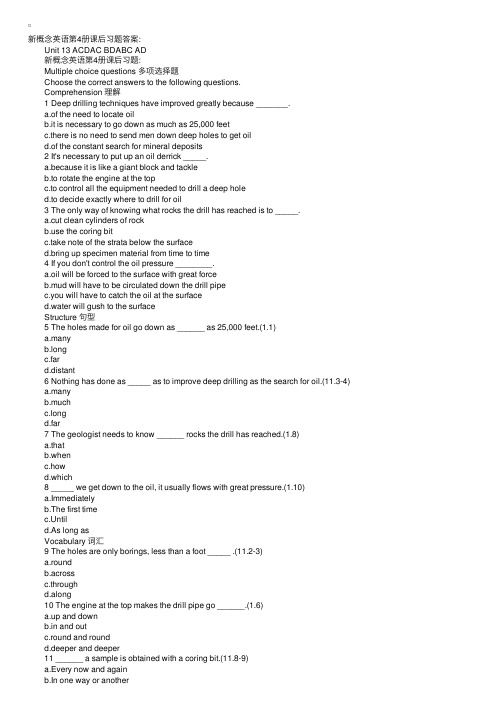
新概念英语第4册课后习题答案: Unit 13 ACDAC BDABC AD 新概念英语第4册课后习题: Multiple choice questions 多项选择题 Choose the correct answers to the following questions. Comprehension 理解 1 Deep drilling techniques have improved greatly because _______. a.of the need to locate oil b.it is necessary to go down as much as 25,000 feet c.there is no need to send men down deep holes to get oil d.of the constant search for mineral deposits 2 It's necessary to put up an oil derrick _____. a.because it is like a giant block and tackle b.to rotate the engine at the top c.to control all the equipment needed to drill a deep hole d.to decide exactly where to drill for oil 3 The only way of knowing what rocks the drill has reached is to _____. a.cut clean cylinders of rock e the coring bit c.take note of the strata below the surface d.bring up specimen material from time to time 4 If you don't control the oil pressure ________. a.oil will be forced to the surface with great force b.mud will have to be circulated down the drill pipe c.you will have to catch the oil at the surface d.water will gush to the surface Structure 句型 5 The holes made for oil go down as ______ as 25,000 feet.(1.1) a.many b.long c.far d.distant 6 Nothing has done as _____ as to improve deep drilling as the search for oil.(11.3-4) a.many b.much c.long d.far 7 The geologist needs to know ______ rocks the drill has reached.(1.8) a.that b.when c.how d.which 8 _____ we get down to the oil, it usually flows with great pressure.(1.10) a.Immediately b.The first time c.Until d.As long as Vocabulary 词汇 9 The holes are only borings, less than a foot _____ .(11.2-3) a.round b.across c.through d.along 10 The engine at the top makes the drill pipe go ______.(1.6) a.up and down b.in and out c.round and round d.deeper and deeper 11 ______ a sample is obtained with a coring bit.(11.8-9) a.Every now and again b.In one way or another c.Often but not always d.After a long time 12 We _____ avoid the old, romantic idea of a gusher.(1.12) a.make sure we b.can't c.attempt d.try to。
新概念第四册课文翻译及学习笔记(Lesson13~15)
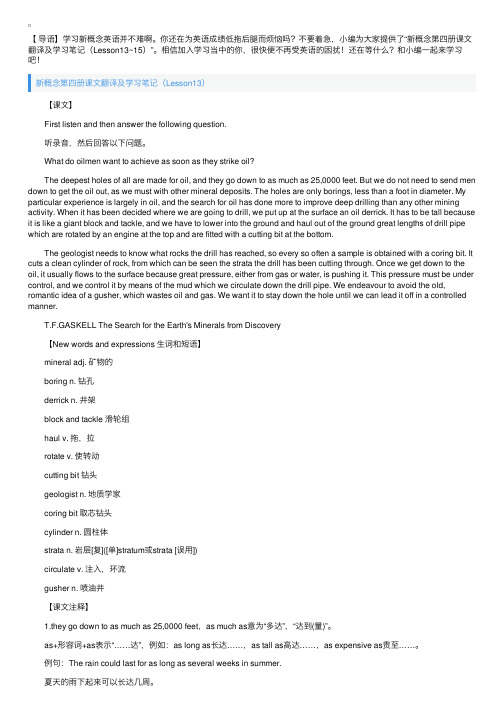
【导语】学习新概念英语并不难啊。
你还在为英语成绩低拖后腿⽽烦恼吗?不要着急,⼩编为⼤家提供了“新概念第四册课⽂翻译及学习笔记(Lesson13~15)”。
相信加⼊学习当中的你,很快便不再受英语的困扰!还在等什么?和⼩编⼀起来学习吧!新概念第四册课⽂翻译及学习笔记(Lesson13) 【课⽂】 First listen and then answer the following question. 听录⾳,然后回答以下问题。
What do oilmen want to achieve as soon as they strike oil? The deepest holes of all are made for oil, and they go down to as much as 25,0000 feet. But we do not need to send men down to get the oil out, as we must with other mineral deposits. The holes are only borings, less than a foot in diameter. My particular experience is largely in oil, and the search for oil has done more to improve deep drilling than any other mining activity. When it has been decided where we are going to drill, we put up at the surface an oil derrick. It has to be tall because it is like a giant block and tackle, and we have to lower into the ground and haul out of the ground great lengths of drill pipe which are rotated by an engine at the top and are fitted with a cutting bit at the bottom. The geologist needs to know what rocks the drill has reached, so every so often a sample is obtained with a coring bit. It cuts a clean cylinder of rock, from which can be seen the strata the drill has been cutting through. Once we get down to the oil, it usually flows to the surface because great pressure, either from gas or water, is pushing it. This pressure must be under control, and we control it by means of the mud which we circulate down the drill pipe. We endeavour to avoid the old, romantic idea of a gusher, which wastes oil and gas. We want it to stay down the hole until we can lead it off in a controlled manner. T.F.GASKELL The Search for the Earth's Minerals from Discovery 【New words and expressions ⽣词和短语】 mineral adj. 矿物的 boring n. 钻孔 derrick n. 井架 block and tackle 滑轮组 haul v. 拖,拉 rotate v. 使转动 cutting bit 钻头 geologist n. 地质学家 coring bit 取芯钻头 cylinder n. 圆柱体 strata n. 岩层[复]([单]stratum或strata [误⽤]) circulate v. 注⼊,环流 gusher n. 喷油井 【课⽂注释】 1.they go down to as much as 25,0000 feet,as much as意为“多达”,“达到(量)”。
新概念英语第四册-学习笔记
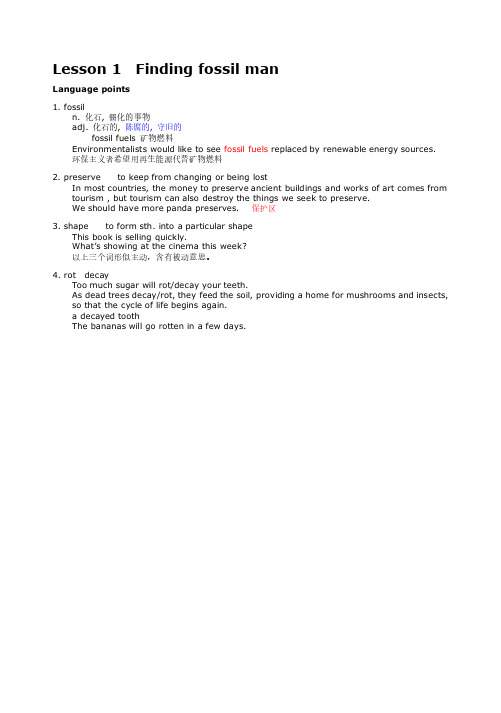
2. 用近义词的重复表强调
They had a single aim, a solitary goal – the top. The contract is null and void because of violations
3. Such inns as there were were generally dirty and flea-ridden. He is not such a man as woud leave his work half done. 他不是做事半途而废的人 Such talents as Nash and Howking can not be easily found.
11. fine
12. linen
13. at the thought
Key structures
1. The more difficult it is, the more highly it is regarded. 越艰险 越让人看中 The more haste , the less speed.
2. the moment…一…就… The minute he saw her he fell in love. 他对她一见倾心。 He was much better the last time I saw her. 上次见到她时她好多了
★ 以上 the moment, the minute, the last time 引导时间状语
perceive to have knowledge of something through one of the senses,sight or through the mind (通过感官,特别是视觉或者思)察觉,看见
(完整版)新概念英语第四册(中英对译)
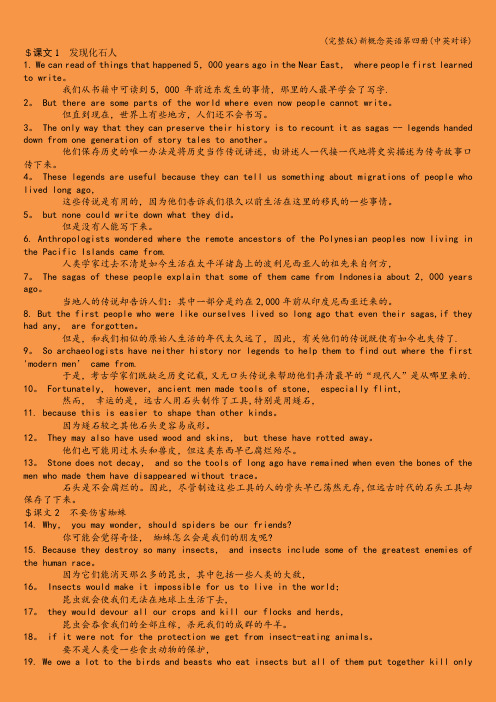
$课文1 发现化石人1. We can read of things that happened 5,000 years ago in the Near East, where people first learned to write。
我们从书籍中可读到5,000 年前近东发生的事情,那里的人最早学会了写字.2。
But there are some parts of the world where even now people cannot write。
但直到现在,世界上有些地方,人们还不会书写。
3。
The only way that they can preserve their history is to recount it as sagas -- legends handed down from one generation of story tales to another。
他们保存历史的唯一办法是将历史当作传说讲述,由讲述人一代接一代地将史实描述为传奇故事口传下来。
4。
These legends are useful because they can tell us something about migrations of people who lived long ago,这些传说是有用的,因为他们告诉我们很久以前生活在这里的移民的一些事情。
5。
but none could write down what they did。
但是没有人能写下来。
6. Anthropologists wondered where the remote ancestors of the Polynesian peoples now living in the Pacific Islands came from.人类学家过去不清楚如今生活在太平洋诸岛上的波利尼西亚人的祖先来自何方,7。
The sagas of these people explain that some of them came from Indonesia about 2,000 years ago。
新概念英语第四册第13课全文句子成分分析
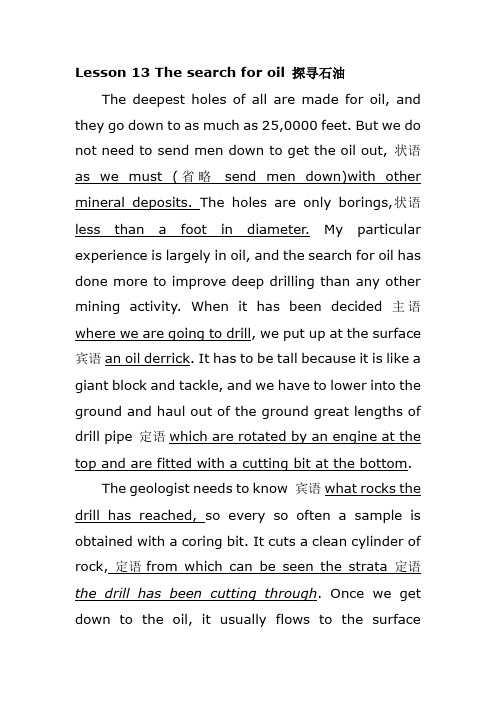
Lesson 13 The search for oil 探寻石油The deepest holes of all are made for oil, and they go down to as much as 25,0000 feet. But we do not need to send men down to get the oil out, 状语as we must (省略send men down)with other mineral deposits. The holes are only borings,状语less than a foot in diameter. My particular experience is largely in oil, and the search for oil has done more to improve deep drilling than any other mining activity. When it has been decided 主语where we are going to drill, we put up at the surface 宾语an oil derrick. It has to be tall because it is like a giant block and tackle, and we have to lower into the ground and haul out of the ground great lengths of drill pipe 定语which are rotated by an engine at the top and are fitted with a cutting bit at the bottom.The geologist needs to know 宾语what rocks the drill has reached, so every so often a sample is obtained with a coring bit. It cuts a clean cylinder of rock, 定语from which can be seen the strata 定语the drill has been cutting through. Once we get down to the oil, it usually flows to the surfacebecause great pressure, 定语either from gas or water, is pushing it. This pressure must be under control, and we control it by means of the mud 定语which we circulate down the drill pipe. We endeavour to avoid the old, romantic idea of a gusher, 定语which wastes oil and gas. We want it to stay down the hole until we can lead it off in a controlled manner状语.。
- 1、下载文档前请自行甄别文档内容的完整性,平台不提供额外的编辑、内容补充、找答案等附加服务。
- 2、"仅部分预览"的文档,不可在线预览部分如存在完整性等问题,可反馈申请退款(可完整预览的文档不适用该条件!)。
- 3、如文档侵犯您的权益,请联系客服反馈,我们会尽快为您处理(人工客服工作时间:9:00-18:30)。
新概念英语四册课堂笔记 Lesson 13:Thames
Waters
L13 Thames Waters
Oxford has been ruined by the motor industry. The peace which Oxford once knew, and which a great university city should always have, has been swept ruthlessly away; and no benefactions and research endowments can make up for the change in character which the city has suffered. At six in the morning the old courts shake to the roar of buses taking the next shift to Cowley and Pressed Steel, great lorries with a double deck cargo of cars for export lumber past Magdalen and the University Church. Loads of motor-engines are hurried hither and thither and the streets are thronged with a population which has no interest in learning and knows no studies beyond servo-systems and distributors, compression ratios and camshafts.
Theoretically the marriage of an old seat of learning and tradition with a new and wealthy industry might be expected to produce some interesting children. It might have been thought that the culture of the university would radiate out and transform the lives of the workers. That this has not happened may be the fault of the university, for at both Oxford and Cambridge the colleges tend to live in an era which is certainly not of the twentieth century, and upon a planet which bears little resemblance to the war-torn Earth. Wherever the fault may lie the fact remains that it is the theatre at Oxford and not at Cambridge which is on the verge of extinction, and the only fruit of the combination of
industry and the rarefied atmosphere of learning is the dust in the streets, and a pathetic sense of being lost which hangs over some of the colleges.。
